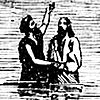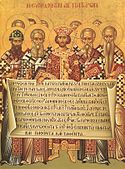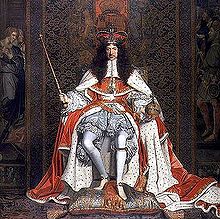- John Clarke (Baptist minister)
-
For other people with the same name, see John Clarke (disambiguation).
John Clarke 
3rd and 5th Deputy Governor of the Colony of Rhode Island and Providence Plantations In office
1669–1670Governor Benedict Arnold Preceded by Nicholas Easton Succeeded by Nicholas Easton In office
1671–1672Governor Benedict Arnold Preceded by Nicholas Easton Succeeded by John Cranston Personal details Born 8 October 1609
Westhorpe, Suffolk, EnglandDied 20 April 1676
Newport, Rhode IslandResting place Dr. Wheatland Blvd., Newport Occupation Baptist Minister, Deputy Governor Religion Baptist John Clarke (8 October 1609 – 20 April 1676) was a medical doctor, Baptist minister, co-founder of the colony of Rhode Island and Providence Plantations, author of its influential charter, and a leading advocate of religious freedom in the Americas.
Contents
Early life
Part of a series on Baptists  BackgroundKey figuresJohn Smyth
BackgroundKey figuresJohn Smyth
Thomas Helwys
Roger Williams
John Bunyan
Shubal Stearns
Andrew Fuller
Charles Spurgeon
D. N. Jackson
William Bullein Johnson Baptist portal
Baptist portalClarke was born at Westhorpe in the county of Suffolk, England on October 8, 1609, to Thomas and Rose (Kerrich) Clarke. He was one of eight children, six of whom moved to America and settled in New England.
According to the well known genealogical work One Hundred and Sixty Allied Families,by John Osborne Austin (Salem, Massachusetts 1893), Clarke's first wife was Elizabeth Harges, daughter of John Harges. John Clarke was married three times according to this source. His second wife was Jane Fletcher, a widow, and his third wife was Sarah Davis, widow of Nicholas Davis.
The source of Clarke's education remains unknown (though some say the University of Leiden), but before arriving in America he had studied theology, languages, and medicine.
Immigration to New England
He first immigrated to Massachusetts Bay in 1637 and then went south to Rhode Island. Clarke immediately sided with Anne Hutchinson and the Antinomians and was one of those forced into exile by Massachusetts Bay. Clarke learned from Roger Williams that Aquidneck Island (Rhode Island) was available, and he, William Coddington, and other settlers purchased it from the Narragansetts. They left Massachusetts and established Portsmouth in 1638. Clarke is one of the signers of the Portsmouth Compact.
In 1639 when William Coddington lost control of the Portsmouth settlement, he, Clarke and seven other major householders left to found Newport, Rhode Island. Clarke headed the church in Newport which was Puritan/Separatist congregation, but he had a religious and political falling out with Coddington. The church split with Clarke taking part and eventually [about 1644] emerging with a Baptist church, while most of the others eventually became Quakers when that movement arrived in Rhode Island in the 1650s.
Establishment of the American Baptist Denomination
Earlier in late 1638, Roger Williams, Clarke's compatriot in the cause of religious freedom in the New World, had established a Baptist church in Providence, Rhode Island, known as First Baptist Church in America. Suddenly in 1847, the First Baptist Church of Newport advanced the claim that it was founded first, and this led to a debate as to which church came first. The major historians have since concluded that the Providence church was first, particularly given the fact that Roger Williams had gathered his church and had resigned as its pastor before Newport was even founded.[1] Even Thomas Bicknell, who regarded Clarke to be far more important than Williams, conceded that the Providence church came first.[2]
 Thomas W. Bicknell and others in front of Dr. John Clarke's grave in Newport
Thomas W. Bicknell and others in front of Dr. John Clarke's grave in Newport
Dr. Clarke's church in Newport is now known as the "United Baptist Church, John Clarke Memorial, of Newport." (the current church meeting house on Spring Street was constructed in 1846).[3] In 1651, John Clarke, John Crandall and Obadiah Holmes were arrested and imprisoned in Lynn, Massachusetts for conducting an illegal worship service. This event (and others like it) served as the basis for Clarke's Ill Newes from New England, or a Narrative of New England's Persecutions (1652). Ill Newes contained Clarke's argument for religious freedom. He wrote that "it is not the will of the Lord than any one should have dominion over another man's conscience....[Conscience] is such a sparkling beam from the Father of lights and spirits that it cannot be lorded over, commanded, or forced, either by men, devils, or angels."[4] One Baptist historian described Clarke as "the Baptist drum major for freedom in seventeenth century America." [5]
King Charles II Charter for Rhode Island and Providence Plantations
In November 1651, Clarke traveled to London with Roger Williams to cancel William Coddington's special patent that made Coddington "Governor for Life" over Aquidneck and Conanicut Islands and to secure a new charter for the colony of Rhode Island. Having succeeded in getting Coddington's charter revoked, Williams returned to Rhode Island in 1654, but Clarke stayed in England as the colony's agent. When the monarchy was restored in 1660 and Rhode Island's charter of 1644 was voided, Clarke worked against great odds to obtain a new charter. On July 8, 1663, Charles II of England granted a Royal Charter to Rhode Island.[6][7] Clarke wrote the charter, and it contained an explicit guarantee of religious freedom: "that no person within the said colony, at any time hereafter shall be any wise molested [harassed], punished, disquieted, or called in question, for any differences in opinion in matters of religion, and do not actually disturb the civil peace of our said colony; but that all and every person and persons may, from time to time, and at all times hereafter, freely and fully have and enjoy his and their own judgments and consciences, in matters of religious concernments, throughout the tract of land hereafter mentioned, they behaving themselves peaceable and quietly..."
The royal charter's words are carved on the frieze of the Rhode Island State House: "...to hold forth a lively experiment, that a most flourishing civil state may stand and best be maintained...with a full liberty in religious concernments." That charter remained the foundation of government in Rhode Island until 1842.
Clarke and Williams continued to labor together for the cause of religious liberty. While Williams was a Baptist only for a few months, Clarke remained faithful for nearly forty years. Williams concluded that no visible church was valid until Christ sent a new apostle to restore it; therefore, he never affiliated with any other church. Clarke continued as the pastor of his church in Newport until his death. He practiced medicine as a means of financial support. He also served on the General Assembly from 1664 to 1669, and three terms as deputy governor (1669–1672). Clarke died in Newport on April 20, 1676, and is buried in the cemetery on Dr. Marcus Wheatland Boulevard across the street from the rear of the Newport Police Station.[8]
Philanthropy
His will set up a trust to be used "for the relief of the poor or bringing up of children unto learning from time to time forever." This trust is generally considered to be the oldest educational trust fund in the United States.[9]
See also
- List of early settlers of Rhode Island
- List of lieutenant governors of Rhode Island
- Colony of Rhode Island and Providence Plantations
Notes
- ^ Leon McBeth, The Baptist Heritage (Broadman Press, 1987) p. 136; Bill J. Leonard, Baptist Ways: A History,(Judson Press, 2003), p. 74; Sydney James, John Clark and His Legacies, (Pennsylvania State University Press, 1999), pp. 15, 26; J. Brent Walker, Religious Liberty and Church-State Separation, (Baptist History and Heritage Society, 2003), 10.
- ^ Thomas Bicknell, The History of Rhode Island and Providence Plantations, (American Historical Society, 1920), vol. 2. pp. 204–205, 576.
- ^ http://www.redwoodlibrary.org/notables/clarke.htm
- ^ John Clarke, Ill Newes from New England, in Colonial Baptists: Massachusetts and Rhode Island, in The Baptist Tradition. Edited by Edwin Gaustad (Arno Press, 1980), p. 6.
- ^ Walter B. Shurden, "Baptist Freedom and the Turn toward a Free Conscience: 1612–1652", in Turning Points in Baptist History, (Mercer University Press, 2008), p. 26.
- ^ [1]
- ^ [2]
- ^ http://www.redwoodlibrary.org/notables/clarke.htm
- ^ James, John Clarke and His Legacies
References
- Dictionary of Baptists in America, Bill J. Leonard, editor ISBN 0-8308-1447-7
- John Clarke and His Legacies: Religion and Law in Colonial Rhode Island, 1638–1750, by Sydney V. James ISBN 0-271-01849-6
- John Clarke (1609–1676): Pioneer in American Medicine, Democratic Ideals, and Champion of Religious Liberty, by Louis Franklin Asher ISBN 0-8059-4040-5
- The Life of Dr. John Clarke, by Wilbur Nelson
- "Clarke, John." The Century Cyclopedia of Names: A Pronouncing and Etymological Dictionary of Names in Geography, Biography, Mythology, History, Ethnology, Art, Archæology, Fiction, Etc. New York: Century Co, 1904.
External links
- Newport Notables
- Pastor John Clarke, M. D.
- Thomas Williams Bicknell, Story of Dr. John Clarke: the founder of the first free commonwealth of the world on the basis of "full liberty in religious concernments," (Providence, RI: Self Published, 1915), pg. 198 [3] (accessible on Google Book Search)
- "The forgotten patriot: One man’s actions forever married religious freedom with democracy" (Boston Globe, 04/28/11) [4]
Colonial Governors and Deputy Governors of Rhode Island Judges of Portsmouth
(1638–1640)Judge of Newport
(1639–1640)Governor of Newport and Portsmouth
(1640–1647)Chief Officer (Providence
and Warwick) (1644–1647)Presidents of Rhode Island
(Patent of 1643) (1647–1663)Governors of Newport and Portsmouth
(Coddington Commission) (1651–1654)Governors of Rhode Island
(Charter of 1663) (1663–1686)Arnold · Brenton · Arnold · N. Easton · Coddington · W. Clarke · Arnold · Coddington · J. Cranston · P. Sanford · Coddington Jr. · Bull · W. ClarkeGovernors under Dominion
of New England (1686–1689)Governors of Rhode Island
(1690–1776)Italics Gorton, Smith and Dexter were presidents of Providence and Warwick only, since Coddington had received a commission to remove Newport and Portsmouth from their jurisdiction, valid from 1651 to 1654; before and after these dates the President presided over all four towns of the colony. Dudley presided over the "Narragansett Country" only, later to become Washington County, Rhode Island; Andros subsequently presided over the entire colony.  Brenton · N. Easton · J. Clarke · N. Easton · J. Clarke · Cranston · Coddington · J. Easton · Cranston · Barker · W. Clarke · Coggeshall · Dominion of New England · Coggeshall · J. Greene · W. Clarke · Tew · Jenckes · Wanton · Jenckes · Nichols · Frye · Wanton · G. Hazard · Abbott · Ward · W. Greene · Whipple Jr. · Robinson · Whipple Jr. · Robinson · Ellery · R. Hazard · Fields · Whipple III · Nichols Jr. · Gardner · Nichols Jr. · Gardner · Wanton Jr. · Brown · Wanton Jr. · Cooke · Sessions · Cooke · Bradford
Brenton · N. Easton · J. Clarke · N. Easton · J. Clarke · Cranston · Coddington · J. Easton · Cranston · Barker · W. Clarke · Coggeshall · Dominion of New England · Coggeshall · J. Greene · W. Clarke · Tew · Jenckes · Wanton · Jenckes · Nichols · Frye · Wanton · G. Hazard · Abbott · Ward · W. Greene · Whipple Jr. · Robinson · Whipple Jr. · Robinson · Ellery · R. Hazard · Fields · Whipple III · Nichols Jr. · Gardner · Nichols Jr. · Gardner · Wanton Jr. · Brown · Wanton Jr. · Cooke · Sessions · Cooke · BradfordOriginal proprietors of Rhode Island's first settlements Those who came with Roger Williams
(1636)Roger Williams · William Harris · John Smith (miller) · Francis Wickes · Thomas Angell · Joshua Verin
Original proprietors of Providence
(signers of "intial deed," October 1638)Roger Williams · Stukeley Westcott · William Arnold · Thomas James · Robert Cole · John Greene · John Throckmorton · William Harris · William Carpenter · Thomas Olney · Francis Weston · Richard Waterman · Ezekiel HolymanPawtuxet Claimants
(Settled 1638; under Massachusetts jurisdiction 1642-1658)Founders of Portsmouth
(signers of Portsmouth Compact, 7 March 1638)William Coddington · John Clarke · William Hutchinson · John Coggeshall · William Aspinwall · Samuel Wilbore · John Porter · John Sanford · Edward Hutchinson, Jr. · Thomas Savage · William Dyre · William Freeborn · Philip Shearman · John Walker · Richard Carder · William Baulston · Edward Hutchinson, Sr. · Henry Bull · Randall Holden · Thomas Clarke · John Johnson · William Hall · John BrightmanFounders of Newport
(Signers of initial agreement, 28 April 1639)William Coddington (Judge) · Nicholas Easton (Elder) · John Coggeshall (Elder) · William Brenton (Elder) · John Clarke (Elder) · Jeremy Clarke (Elder) · Thomas Hazard (Elder) · Henry Bull (Elder) · William Dyre (Elder; clerk)Founders of Warwick
(Original purchasers, 1643)Randall Holden · John Greene · John Wickes · Francis Weston · Samuel Gorton · Richard Waterman · John Warner · Richard Carder · Samson Shotten · Robert Potter · William Wodell · Nicholas PowerItalics: The names of Clarke, Johnson, Hall, and Brightman at the end of the Portsmouth list were crossed out, and it is uncertain if they came to Portsmouth, though most, if not all, of them did appear on Aquidneck Island. Source for template:Arnold, Samuel Greene (1859). History of the State of Rhode Island and Providence Plantations. Vol.1. New York: D. Appleton & Company. pp. 97,100,132,176. OCLC 712634101. http://books.google.com/books?id=iUJg2uqb7LgC&printsec=frontcover&dq=History+of+Rhode+Island+Arnold&source=bl&ots=5xs2gELaCW&sig=oYrVd9SCIjB1ndJeQrPz0-yw33k&hl=en&ei=yPSxTdW_K-Hi0QGM-6WJCQ&sa=X&oi=book_result&ct=result&resnum=5&ved=0CDcQ6AEwBA#v=onepage&q&f=false. History of Christianity Centuries: 1st 2nd 3rd 4th 5th 6th 7th 8th 9th 10th 11th 12th 13th 14th 15th 16th 17th 18th 19th 20th 21st • Early • Roman • Medieval • Modern
Jesus and the Apostolic Age Background · Ministry · Good News · Crucifixion & Resurrection · Holy Spirit · Gospels · Acts · The 12 · Paul · Acts 15

Ante-Nicene Period Judaism split · Justin Martyr · Ignatius · Persecution · Fathers · Irenaeus · Marcionism · Canon · Tertullian · Montanism · Origen
Christian Empire Constantine the Great · Monasticism · Councils: Nicaea I · Creed · Athanasius · Arianism · Jerome · Augustine · Councils II · III · IV
Eastern Christianity Orthodoxy · Greece · Asia · Church of the East · Oriental Orthodoxy · Coptic · Nestorianism · Syria · Armenia · Ethiopia · Chrysostom · Iconoclasm · Bulgaria · Great Schism · Fall · Ottoman · Russia · America · 20th century
Middle Ages Pelagianism · Gregory I · Celtic · Germanic & Scandinavian · Kievan Rus' · Investiture · Anselm · Abelard · Bernard of Clairvaux · Crusades · Inquisition · Scholasticism · Dominic · Francis · Bonaventure · Aquinas · Wycliffe · Avignon · Papal Schism · Jan Hus · Conciliarism
Protestant
ReformationProtestantism · Erasmus · Five solas · Eucharist · Calvinist v. Arminian · Arminianism · Dort · Wars
Lutheranism · Martin Luther · 95 Theses · Diet of Worms · Melanchthon · Orthodoxy · Eucharist · Book of Concord
Reformed · Zwingli · Calvin · Calvinism history · Scotland · Knox · TULIP · Dort · Westminster
Anglicanism · Timeline · Henry VIII · Cranmer · Settlement · 39 Articles · Common Prayer · Puritans · Civil War
Anabaptism · Radical Reformation · Grebel · Swiss Brethren · Müntzer · Martyrs' Synod · Menno Simons · SmythCatholicism Primacy development · Papacy · Timeline · Lateran IV · Trent · Counter-Reformation · Thomas More · Leo X · Guadalupe · Jesuits · Jansenists · Xavier · Monastery dissolution · Wars · Teresa · Vatican I & II · Modernism
Modern Christianity
and RevivalismEnglish denominations · Baptists · Congregationalism · Great Awakening · Methodism · Millerism · Pietism · Neo- & Old Lutherans · Restoration Movement · Jehovah's Witnesses · Mormonism · Seventh-day Adventism
Industrial Age Age of Ideologies Timeline · Missions Timeline · Martyrs · Theology · Eastern Orthodoxy · Oriental Orthodoxy · Protestantism · Catholicism
Articles Related to Rhode Island and The Providence Plantations
The Ocean State State of Rhode Island and Providence Plantations
State of Rhode Island and Providence PlantationsProvidence (capital) Topics Culture | Delegations | Geography | Government | History | Thirteen Colonies | Colonial Colleges | Images | Narragansett Indian Tribe | People | Visitor attractions | State symbols
Regions Counties: Bristol | Kent | Newport | Providence | Washington | Geographic: Blackstone Valley | Block Island
Cities Central Falls | Cranston | East Providence | Newport | Pawtucket | Providence | Warwick | Woonsocket
Towns Barrington | Bristol | Burrillville | Charlestown | Coventry | Cumberland | East Greenwich | Exeter | Foster | Glocester | Hopkinton | Jamestown | Johnston | Lincoln | Little Compton | Middletown | Narragansett | New Shoreham (Block Island) | North Kingstown | North Providence | North Smithfield | Portsmouth | Richmond | Scituate | Smithfield | South Kingstown | Tiverton | Warren | Westerly | West Greenwich | West Warwick
Categories:- 1609 births
- 1676 deaths
- 17th-century Baptist clergy
- American Christian religious leaders
- American colonial people
- American people of English descent
- American philanthropists
- American theologians
- Baptist ministers from the United States
- History of Christianity in the United States
- History of the Thirteen Colonies
- New England Puritanism
- People from Mid Suffolk (district)
- Pre-state history of Rhode Island
- History of religion in the United States
- Rhode Island colonial-era clergy
- Rhode Island colonial people
- Rhode Island politicians
Wikimedia Foundation. 2010.

